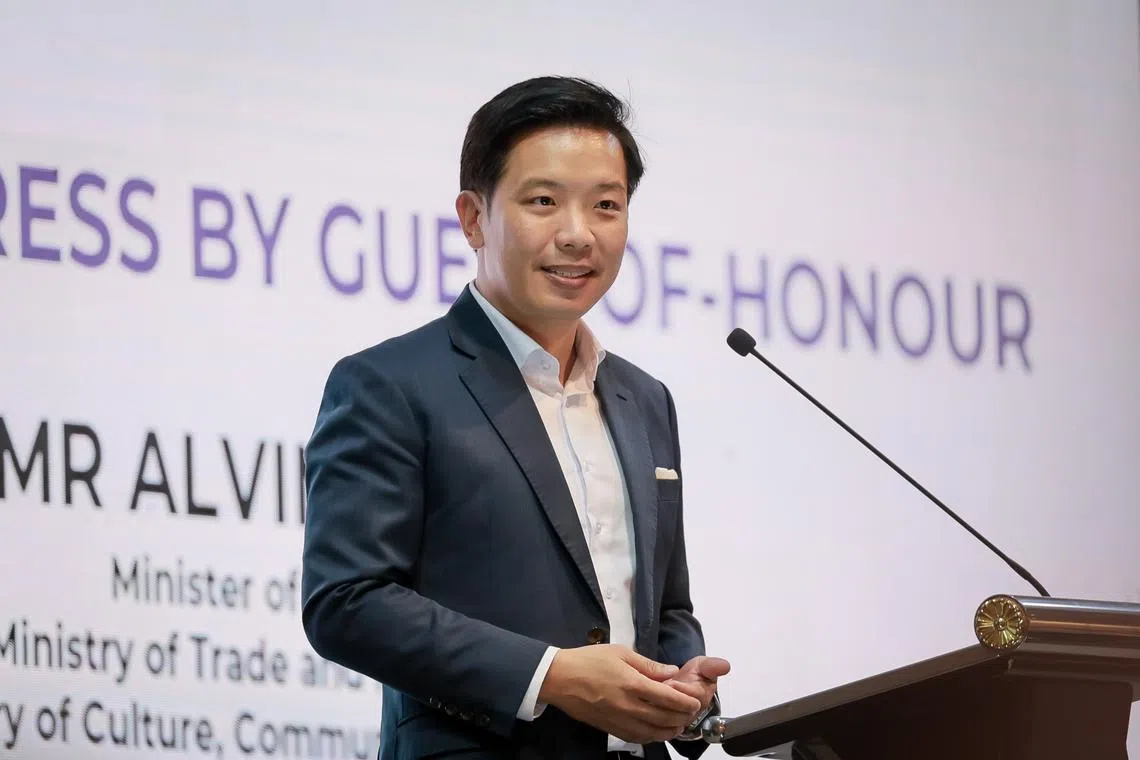S’pore’s apex business chamber to help wholesalers ply trade with digital and green talent
Sign up now: Get ST's newsletters delivered to your inbox

Minister of State for Trade and Industry Alvin Tan speaking at the launch of the Job-Skills Integrator for Wholesale Trade on Aug 5.
ST PHOTO: GAVIN FOO
SINGAPORE ‒ Singapore’s wholesale trade sector, the largest contributor to its economy, is getting a boost to its efforts to build a pipeline of talent to let it keep its edge globally.
The sector, accounting for over 20 per cent of Singapore’s economy and 300,000 jobs, can now turn to the Singapore Business Federation (SBF) for help.
“With trade being three times our GDP (gross domestic product), if we don’t do trade, I think we are not Singapore,” said Minister of State for Trade and Industry Alvin Tan at the launch of the Jobs-Skills Integrator for Wholesale Trade (JSIT-WST) on Aug 5.
The launch was held at an industry event jointly organised by Workforce Singapore and SBF, which was appointed to lead the JSIT-WST.
Titled Workforce Transformation for Wholesale Trade Sector, the event, which was held at the Lifelong Learning Institute in Paya Lebar, is part of the ongoing SkillsFuture Festival 2024 ending Aug 21.
Jobs-Skills Integrators are institutions appointed to ensure training will improve employment and earnings prospects by working with industry, training and job placement partners in a designated sector.
In Budget 2023, the Government earmarked three pilot sectors in which integrators would be appointed: retail, precision engineering and wholesale trade.
Under the JSIT-WST, wholesale traders will get to tap the expertise of jobs-skills advisers for free.
These advisers, who are industry veterans, will provide customised advice, including on how jobs can be redesigned, as well as laying out the skills existing employees can develop so that their firms can partake in promising industry trends.
Observers have said that the sector needs to press on with introducing digital solutions that raise efficiency, as well as play its part in the green transition, to maintain its advantage both at home and abroad. This means employers need to train both fresh talent and existing workers in the sector to pick up new skills that can help put in place new technology and processes.
SBF chief executive Kok Ping Soon told reporters that the federation hopes to engage about 1,700 companies through the JSIT-WST and enable reskilling in 1,600 roles over the next three years.
SBF will refer to the Jobs Transformation Map for Wholesale Trade, which was released in 2021, for the JSIT-WST.
The JSIT-WST is the last of the three integrators to be unveiled, after the two others in 2023.
Mr Kok said this was because of the sheer variety of firms in the sector in terms of size, business model and the industries they serve, which means they each experience challenges differently.
This also meant the federation had to take time to pull together an industry consortium to aid in its efforts, which he said was a first among the three pilot integrators.
The consortium comprises workforce consultancies AngusKnight Singapore and Ingeus Singapore, professional networking platform LinkedIn, the National Trades Union Congress’ Employment and Employability Institute, human resources technology provider JobKred and training provider SIM Academy.
Mr Kok also said the federation decided to take on the appointment, which is co-funded by Enterprise Singapore, because of how fragmented the sector is.
“There isn’t any particular association out there that supports this sector,” he said, adding that about 20 per cent of its membership, or around 6,000 companies, are in the wholesale trade sector.
Moreover, SBF already runs various human capital development programmes relevant for the sector, such as career conversion programmes for wholesale trade, as well as for sustainability professionals, that dovetail with the aims of the JSIT-WST, Mr Kok said.
While he noted that small to medium-sized firms with between $10 million and $100 million in annual revenue are likely to benefit most from the JSIT-WST, Mr Kok welcomed smaller firms to reach out and explore how they could benefit as well.
The JSIT-WST initiative is also supported by Workforce Singapore and SkillsFuture Singapore.
In his speech, Mr Tan outlined the promise of using digital technologies like artificial intelligence to forecast demand, manage inventory and plan delivery routes.
He also spoke on how climate change is driving demand for sustainable products and services along the whole supply chain.
Mr Tan noted that smaller firms in the sector may find it difficult to attract talent, which is a challenge the JSIT-WST addresses.
“SBF will work with employment facilitation agencies to help you identify individuals with the right aptitude and who are fit for training to fill up these jobs in the roles that all of you are looking for,” he said, addressing representatives from the 170 or so companies in attendance.
Mr Tan also presented the inaugural Workforce Transformation Award for the Wholesale Trade to two firms for their transformation efforts at the event.
They are consumer products and commodity trading company Franco-Asian Enterprises, and food and beverage distributor and logistics service provider Lim Siang Huat.
Franco-Asian Enterprises managing director Julien Bely said the firm initially used five to six different software programmes across its human resources, accounting and other departments.
Most of these functions have been unified over the course of 2022 and 2023 onto one platform with the help of various schemes including the Productivity Solutions Grant, greatly simplifying work processes.
Mr Bely added that the firm’s next target is to understand how it can contribute to the sustainability push already ongoing in the logistics sector.
On his hopes for the JSIT-WST, he said: “We are... definitely looking at ways to identify possible future employees or look at how we can reskill our own employees to fit a different role that may open up in future.”
He also expressed hopes that the JSIT-WST’s efforts would improve perceptions of a job in wholesale trade, especially roles that pertain to logistics.


